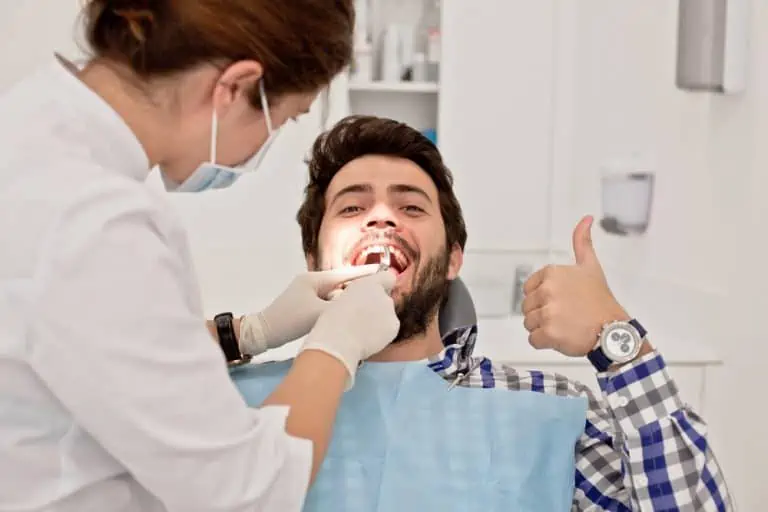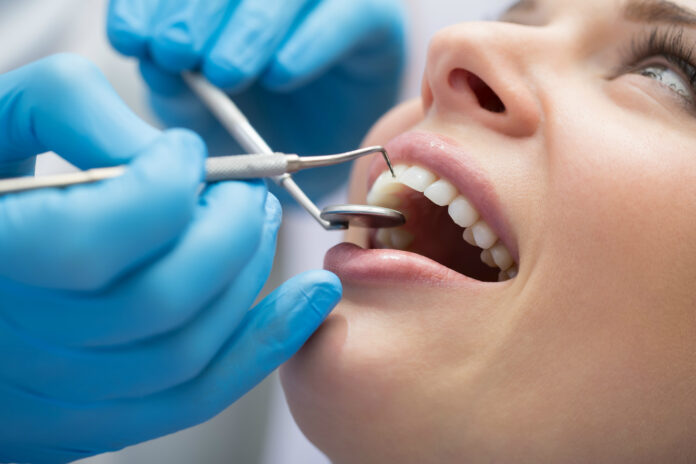Benefits of Regular Dental Checkups
1. Prevention of Tooth Decay and Cavities
One of the primary reasons for regular dental checkups is the prevention of tooth decay and cavities. Plaque and tartar buildup can lead to cavities, which, if left untreated, can cause significant pain and lead to tooth loss. During a dental checkup, your dentist will clean your teeth thoroughly, removing plaque and tartar that regular brushing and flossing may miss. This professional cleaning is essential because it targets areas that are often difficult to reach, even with diligent home care.
2. Early Detection of Gum Disease
Gum disease, also known as periodontal disease, is a severe condition that can lead to tooth loss if not treated promptly. Regular dental checkups help in the early detection and treatment of gum disease. Your dentist will examine your gums for signs of inflammation, bleeding, or recession, and provide appropriate treatment to prevent the disease from progressing. Early intervention can include regular dental checkups, deep cleaning, scaling, and root planing, which are far more effective when gum disease is caught in its initial stages.
3. Oral Cancer Screening
Oral cancer is a serious health concern that can be life-threatening if not detected early. During a regular dental checkup, your dentist will perform an oral cancer screening, looking for any signs of cancerous or precancerous conditions. Early detection significantly increases the chances of successful treatment. The screening process involves a thorough examination of your mouth, throat, and neck, ensuring any suspicious lesions or growths are identified and addressed promptly.
4. Maintaining Overall Oral Health
Regular dental checkups help in maintaining overall oral health by addressing minor issues before they become major problems. Your dentist will check for any signs of dental problems such as broken fillings, cracked teeth, or misaligned bites, and recommend necessary treatments to keep your mouth healthy. Additionally, regular visits can help identify problems with teeth alignment and jaw issues, which can prevent more complicated orthodontic treatments in the future.
5. Fresh Breath and Aesthetic Benefits
Beyond health, regular dental checkups can also contribute to a fresher breath and a more attractive smile. Professional cleanings remove plaque and tartar that cause bad breath and discoloration. Your dentist can also provide whitening treatments and advice on maintaining a bright, healthy smile.

What to Expect During a Dental Checkup
A regular dental checkup typically involves the following steps:
1. Medical History Review
Your dentist will review your medical history to understand any underlying conditions that may affect your oral health. Regular dental checkups includes discussing any medications you are taking, allergies, and any recent health changes. This step ensures that your dental care is tailored to your specific needs and conditions.
2. Visual Examination
The dentist will perform a thorough visual examination of your teeth, gums, and mouth if you do regular dental checkups. They will look for signs of cavities, gum disease, and other oral health issues. This examination includes checking for signs of tooth wear, bite issues, and any abnormalities that might need further investigation.
3. X-Rays
Regular dental checkups involves X-rays.X-rays are often taken to provide a detailed view of your teeth and jawbone. Regular dental checkups help in detecting issues that may not be visible during the visual examination, such as impacted teeth, abscesses, or bone loss. These images are crucial for diagnosing problems below the gum line or inside the teeth.
4. Professional Cleaning
A dental hygienist will clean your teeth using specialized tools to remove plaque and tartar buildup. This process includes scaling, polishing, and flossing to ensure your teeth are thoroughly cleaned. Professional cleaning not only improves the appearance of your teeth but also prevents the progression of gum disease.
5. Examination by the Dentist
After the cleaning, the dentist will perform a more detailed examination of your mouth. Regular dental checkups will check for any signs of dental problems and discuss any concerns you may have. This step often involves a periodontal probe to measure the depth of gum pockets, an indicator of gum health.
6. Treatment Recommendations
If any issues are detected, your dentist will recommend appropriate treatments. This may include fillings, crowns, root canals, or other procedures to address dental problems. They will also provide guidance on preventive care and any follow-up appointments necessary.
Tips for Maintaining Oral Hygiene Between Checkups
Maintaining good oral hygiene between dental checkups is crucial for overall dental health. Here are some tips to help you keep your teeth and gums healthy:
1. Brush Twice a Day
Brush your teeth at least twice a day using a fluoride toothpaste. Make sure to brush for at least two minutes, covering all surfaces of your teeth. Use a toothbrush with soft bristles to avoid damaging your gums and enamel.
2. Floss Daily
Flossing helps remove plaque and food particles from between your teeth and along the gumline. Make it a habit to floss at least once a day. Proper flossing techniques are essential for reaching areas that a toothbrush cannot.
3. Use Mouthwash
Regular dental checkups suggests antimicrobial mouthwash can help reduce plaque and prevent gum disease. Choose a mouthwash that is alcohol-free to avoid drying out your mouth. Mouthwash can also help to reduce bad breath and provide additional fluoride protection.
4. Maintain a Healthy Diet
A balanced diet rich in fruits, vegetables, and whole grains helps promote healthy teeth and gums. Limit your intake of sugary and acidic foods and beverages, as they can contribute to tooth decay. Foods high in calcium and phosphorus, like dairy products and nuts, are beneficial for strengthening tooth enamel.
5. Avoid Tobacco Products
Tobacco use is a major risk factor for oral cancer, gum disease, and other dental problems. Avoiding tobacco products can significantly improve your oral health. If you need help quitting, seek support from your dentist or healthcare provider.
6. Stay Hydrated
Drinking plenty of water helps wash away food particles and bacteria from your mouth. It also helps keep your saliva production at optimal levels, which is essential for maintaining oral health. Saliva neutralizes acids produced by bacteria in the mouth and helps to remineralize enamel.
7. Chew Sugar-Free Gum
Chewing sugar-free gum after meals can help stimulate saliva production, which aids in neutralizing acids and cleaning the mouth. It can also help to remove food particles and freshen breath.
The Role of Technology in Modern Dental Checkups
Modern dental practices have incorporated advanced technology to improve the accuracy and comfort of dental checkups. Here are some technological advancements that may be part of your dental visit:
1. Digital X-Rays
Digital x-rays reduce radiation exposure and provide clearer images compared to traditional film x-rays. They are also faster, allowing for immediate viewing and analysis by the dentist.
2. Intraoral Cameras
Intraoral cameras are small, handheld devices that allow dentists to take high-resolution images of the inside of your mouth. These images can be displayed on a screen, helping you to see what the dentist sees and understand the condition of your oral health better.
3. Laser Dentistry
Laser technology is used for a variety of dental procedures, including cavity detection, gum disease treatment, and teeth whitening. Lasers can provide more precise treatment with less discomfort and faster healing times.
4. CAD/CAM Technology
Computer-aided design and manufacturing (CAD/CAM) technology is used to create precise dental restorations, such as crowns and veneers, in a single visit. This technology improves the fit and durability of restorations.
Addressing Dental Anxiety
Many people experience anxiety when visiting the dentist. It’s important to address these fears to ensure you receive the necessary care. Here are some strategies to help manage dental anxiety:
1. Communicate with Your Dentist
Share your fears and concerns with your dentist. A good dentist will listen and provide reassurance, explaining procedures in detail to help you feel more comfortable.
2. Practice Relaxation Techniques
Techniques such as deep breathing, visualization, and meditation can help reduce anxiety. Practice these techniques before and during your dental visit.
3. Bring a Friend or Family Member
Having a trusted person accompany you to your appointment can provide emotional support and help you feel more at ease.
4. Consider Sedation Dentistry
For severe anxiety, sedation dentistry options such as nitrous oxide (laughing gas), oral sedatives, or intravenous (IV) sedation may be available. Discuss these options with your dentist to find the best solution for your needs.
Conclusion
Regular dental checkups are a vital part of maintaining good oral health and overall well-being. They help prevent dental issues, detect potential health problems early, and ensure that your teeth and gums stay healthy. By following good oral hygiene practices and visiting your dentist regularly, you can enjoy a healthy, beautiful smile for years to come.
Further Reading and Resources
For more information on the importance of regular dental checkups and oral health, check out the following resources:




